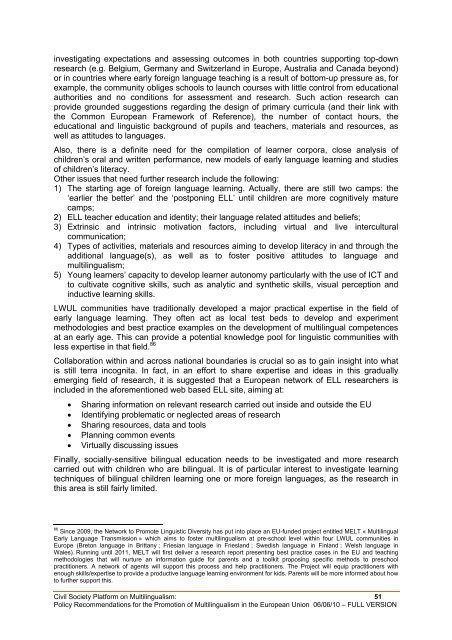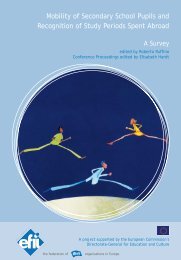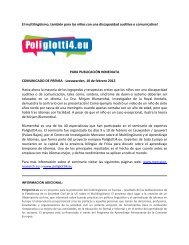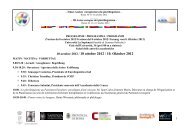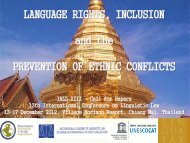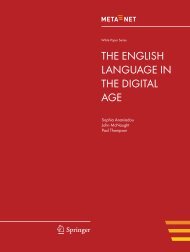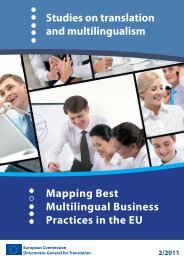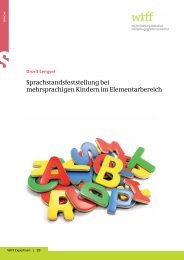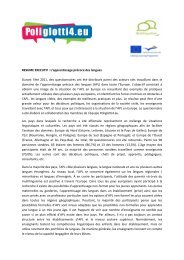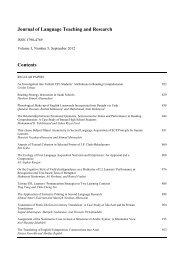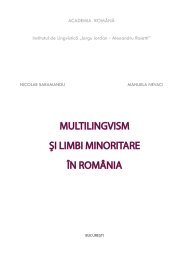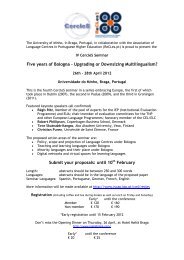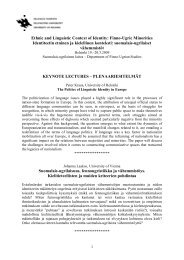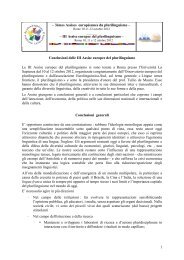FULL VERSION - European Commission - Europa
FULL VERSION - European Commission - Europa
FULL VERSION - European Commission - Europa
Create successful ePaper yourself
Turn your PDF publications into a flip-book with our unique Google optimized e-Paper software.
investigating expectations and assessing outcomes in both countries supporting top-downresearch (e.g. Belgium, Germany and Switzerland in Europe, Australia and Canada beyond)or in countries where early foreign language teaching is a result of bottom-up pressure as, forexample, the community obliges schools to launch courses with little control from educationalauthorities and no conditions for assessment and research. Such action research canprovide grounded suggestions regarding the design of primary curricula (and their link withthe Common <strong>European</strong> Framework of Reference), the number of contact hours, theeducational and linguistic background of pupils and teachers, materials and resources, aswell as attitudes to languages.Also, there is a definite need for the compilation of learner corpora, close analysis ofchildren’s oral and written performance, new models of early language learning and studiesof children’s literacy.Other issues that need further research include the following:1) The starting age of foreign language learning. Actually, there are still two camps: the‘earlier the better’ and the ‘postponing ELL’ until children are more cognitively maturecamps;2) ELL teacher education and identity; their language related attitudes and beliefs;3) Extrinsic and intrinsic motivation factors, including virtual and live interculturalcommunication;4) Types of activities, materials and resources aiming to develop literacy in and through theadditional language(s), as well as to foster positive attitudes to language andmultilingualism;5) Young learners’ capacity to develop learner autonomy particularly with the use of ICT andto cultivate cognitive skills, such as analytic and synthetic skills, visual perception andinductive learning skills.LWUL communities have traditionally developed a major practical expertise in the field ofearly language learning. They often act as local test beds to develop and experimentmethodologies and best practice examples on the development of multilingual competencesat an early age. This can provide a potential knowledge pool for linguistic communities withless expertise in that field. 86Collaboration within and across national boundaries is crucial so as to gain insight into whatis still terra incognita. In fact, in an effort to share expertise and ideas in this graduallyemerging field of research, it is suggested that a <strong>European</strong> network of ELL researchers isincluded in the aforementioned web based ELL site, aiming at: Sharing information on relevant research carried out inside and outside the EU Identifying problematic or neglected areas of research Sharing resources, data and tools Planning common events Virtually discussing issuesFinally, socially-sensitive bilingual education needs to be investigated and more researchcarried out with children who are bilingual. It is of particular interest to investigate learningtechniques of bilingual children learning one or more foreign languages, as the research inthis area is still fairly limited.86Since 2009, the Network to Promote Linguistic Diversity has put into place an EU-funded project entitled MELT « MultilingualEarly Language Transmission » which aims to foster multilingualism at pre-school level within four LWUL communities inEurope (Breton language in Brittany ; Friesian language in Friesland ; Swedish language in Finland ; Welsh language inWales). Running until 2011, MELT will first deliver a research report presenting best practice cases in the EU and teachingmethodologies that will nurture an information guide for parents and a toolkit proposing specific methods to preschoolpractitioners. A network of agents will support this process and help practitioners. The Project will equip practitioners withenough skills/expertise to provide a productive language learning environment for kids. Parents will be more informed about howto further support this.Civil Society Platform on Multilingualism: 51Policy Recommendations for the Promotion of Multilingualism in the <strong>European</strong> Union 06/06/10 – <strong>FULL</strong> <strong>VERSION</strong>


